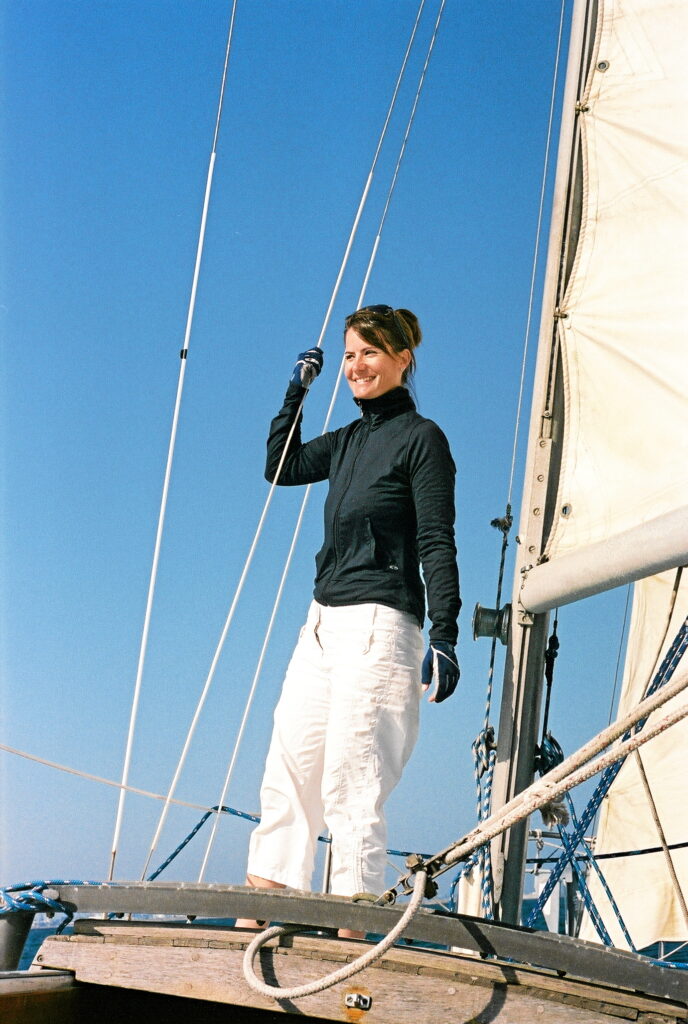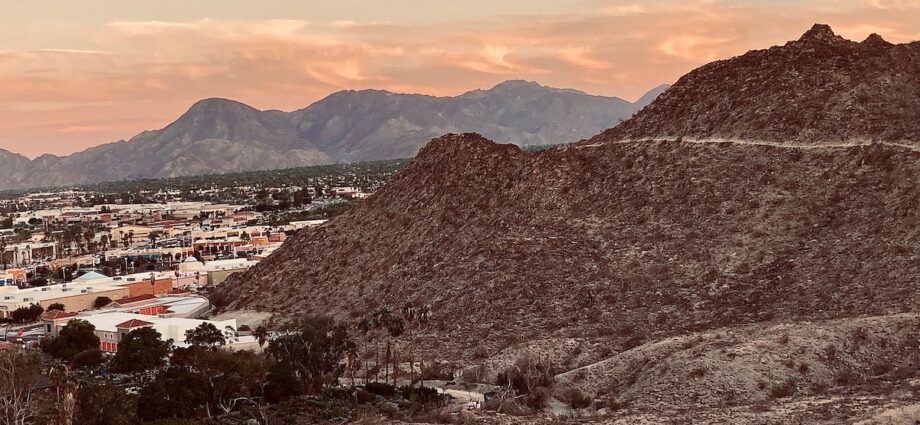“Do you ever get anywhere?” the Hare asked with a mocking laugh. “Yes,” replied the Tortoise, “and I get there sooner than you think.”
Aesop’s Fables
I will never forget the first time I stood at the helm of a tall ship. It was mid-November and we had left an icy Boston en route to Bermuda. Sometime the night before we crossed the Gulf Stream and the temperature rose by 20 degrees. As we sailed into the dawn, we looked like some tattered ghost ship with the crew’s clothing hung out to dry along the lower rigging, and everyone walking the decks with their pale faces turned toward the sun.
In mid-afternoon the captain caught a mahi-mahi, which I carved on the sun-drenched deck and grilled for fish tacos. It was a glorious day. The sun had just set and the crests of the waves were illuminated by moonlight when the captain offered me the wheel. At that point, I had maybe a hundred hours of sailing experience on my grandfather’s 27-foot Newport. I prided myself on being good at steering. Then I took hold of that 137-foot ship. Hmm, let me rephrase: it took hold of me.
We had big following seas, which pushed the boat down each wave and before I knew it, we were off course. I tried to bring the boat back on course, but put the wheel too hard over to port, in what’s called an “overcorrection”. Then, in an attempt to fix things, I overcorrected again, going too far to starboard. The captain and the mate looked at me, looked at each other, and grinned. Greenhorn.
The smaller the vessel, the easier it is to sense that you’re off course, but this takes a minute to see when you’re behind the wheel of a large boat, and before you know it, your attempt to fix things has taken you further in the wrong direction.
Fear is instinctive
My father was visiting last week and I told him I thought that one reason we were seeing so much volatility in the stock market could have something to do with the fact that there were so many inexperienced investors now.
“You think retail investors can sway the market?” he asked, dubious. (Retail investors is the term for people like you and me, as opposed to the famous names, hedge funds, banks and other large institutions.)
Yes, I told him, I think retail investors as a group can have an impact, and then the advanced algorithms of the institutional investors play off of and accentuate the swings. This is just a theory of mine, mind you, but I base it on a few things.
First, some stats: “Individual market activity makes up around 20-25% of overall market activity.” That’s a staggering number. Per the stats above, “around 15% of retail investors today got their start in 2020” and more than 50% of them are millennials. To me, this stat says that not only do retail investors have the power to sway the market, but that many are green and the tendency to overcorrect is probably strong.
It’s not hard to imagine that if you put your savings into the market two years ago, and you just saw it slide by 20-30%, or, let’s say you were mostly in risky investments and are suffering even worse declines, you would, understandably, overcorrect. You might jump ship altogether.
In sailing, overcorrecting doesn’t mean you won’t make it to your destination, you just won’t make it there as fast because you won’t be sailing the most efficient course. Could you get lucky? Yes. The winds might adjust in your favor and you might just be able to sail faster. But that’s a big “if” and not the likely scenario.
To quote Morgan Stanley Wealth Management’s Chief Investment Officer Lisa Shalett on a call yesterday, “If you’re selling in a down market, all you’re ensuring is that you are locking in losses.”
Or, as Brian Sommers and Ryan Furtwangler wrote in their April article for HBKS, “Let’s address the idea of selling everything and putting it all in cash. Not a good idea—at least not beyond a reasonable cash reserve… Cash loses to inflation, last year by about 7 percent. Cash also eliminates market return potential. Bonds and other investments may decline in value at times, but they make money over time—and outdistance inflation. Cash can’t do that. In essence, cash is betting that you can see into the future, just like trying to time selling stocks and bonds. Historically that has turned out very poorly for investors.”
I once heard a financial advisor say that 90% of his job was telling people not to sell. In essence, advisors are the dispensers of desensitization therapy for people who are afraid of market downswings, repeatedly reminding their clients that the fear will pass, and they will be okay. The captains, if you will, standing behind the greenhorns.
The allure of the lucky play
Like millions of other people around the world, I do the daily Wordle. My best friend follows the AI advice, and each day systematically enters the word with the most likely assembly of letters. Not I; it’s a game, after all, and I like to try my luck. But when it comes to investing, I’d rather take the most likely course rather than the lucky guess any day. Wordle has no consequences, but when it comes to investing, the consequences to choosing the lucky, the haphazard or the random approach over the sure and systematic are life-changing.
Every now and then I hear someone say that they got out of the market in 2009, or 2020, or just now. These people are also typically the same ones who fear the market. “It’s not for me,” they might say.
In my blog post on my investing philosophy, I talked about being an optimist, but that’s not why I invest. Investing in companies is an investment in our economy, in jobs, in each other. When we take money out of the market, we are essentially removing the fuel that companies need to grow and adapt to new conditions like foreign competition or global warming.
People who fear the market often say that it’s gambling or speculation. That might be true if you played the market like I play Wordle. If you just threw a dart at a single stock and hoped it would make you a millionaire. It might be true if you invested in something with no inherent value.
But if you’d just invested in the S&P for years, you would have contributed to, and benefited from the growth of the global economy. One obvious large-scale shift caused by people investing (as opposed to speculating) is ESG. We are seeing the power of all of those investors who have placed their money in ESG stocks, the majority of whom are women, by the way, as their dollars direct and empower companies’ efforts to decarbonize and do the right thing. So even beyond the fact that your investing dollars are going into our economy, jobs, and even, in a round-about way, our government, via payroll and other taxes, investing is a way to shape the future. (Oh, and did I mention ESG funds are also showing signs of being more resilient?)
“Slow and steady wins the race,” says Aesop’s fable. If you nap on the sidelines, you’ll lose every time to the turtle.
The view from above
There’s a hike I do near our house called the “Bump and Grind.” I’ve done it at all times of the day, and in several seasons. I’ve done the loop starting with the grind, and other times starting with the bump. It’s grueling either way. Depending on which end you start, though, and the time of day, your perspective changes. Rocks that seem formidable at mid-day look flat and unassuming in the bright light of morning. The relentless switchbacks are a slide going down, and a bear going up.
The one consistent view, however, and the most rewarding, is the one from the top, looking down over the valley. From there, everything below looks… small. We are just tiny players in this massive game.
One friend of mind keeps trying to time the bottom of the market. “I don’t think we’ve seen it yet,” he told me last week. Maybe not, I told him, but maybe we have. One thing is certain: the whales and the institutional investors will see it before we do. They not only have the benefit of years at the wheel, but advanced algorithms, sophisticated options strategies and a view from the top.
That trip to Bermuda was my first voyage out of view of land. Anything felt possible. We might take flight. We might discover Atlantis. Or, we might get smacked down by a tsunami. Or sink in a white squall. It’s easy to see how sailors of yore thought they might fall off the side of the earth. Or how we might have ended up in Africa, or the mysterious Triangle. But – spoiler alert – we ended up in Bermuda as planned.
After that trip, I went on to sail thousands of sea miles. I still consider myself a novice. But every time I’m out on a boat is another learning opportunity, and reading is one way to compile the experiences of those who’ve gone before me. Slocum. Moitessier. Chichester. The Pardeys. Twice, my husband and I have been caught in conditions that tested us. But we know that panic is the enemy, so when the fear takes hold, and the boat becomes hard to control, the best thing we can do is take a mental step back, see the big picture and work to get back on course.
It is the same with investing. If the market has you down, be calm. Try to get a bird’s eye view. Steer the course. Be the turtle.

